Here’s how to get more fiber in your daily diet and care for your health.

Most of us need to eat more fiber. More than 90 % of women and 97 % of men don’t meet the amount recommended for good health, according to the U.S. Government’s Dietary Guidelines for Americans. One reason may be that dietary fiber is hard to find, especially in highly processed foods, like fast foods, that make up a large part of the Standard American Diet.
You can make meeting your fiber quota a lot easier by shifting away from processed foods and toward a variety of whole foods. But if you want to know specifically where the most dietary fiber can be found, read on and take note of these easy and tasty ways to sneak more of this disease-preventing nutrient into your meals and snacks.
Why you need more fiber
You probably know from experience that eating more fiber means you won’t have to worry about being constipated. Your stools are bulkier, softer, and easier to pass. And you’ve certainly heard that fiber helps lower total cholesterol levels by lowering the “bad” low-density lipoprotein (LDL).
But fiber helps control blood sugar levels, too, helping you to maintain a healthy weight. It’s also important for your gut health and reducing chronic inflammation, and lowering your risk of type 2 diabetes, heart disease, and some cancers, according to the Mayo Clinic.
How much fiber do you need per day?
“30 grams of fiber a day is a great general health goal to reach for adults,” says Eat This, Not That! Medical Review Board member and registered dietitian Julie Upton. “Most are only eating about 15 grams per day…and a good rule of thumb when comparing fiber amounts in packaged foods found on the nutrition labels is if a food has 3 grams or more of fiber, it’s the better choice,” says Upton.
To meet this recommended amount of daily fiber, here are some sneaky ways to make it happen.
1Make fiber a part of your morning routine.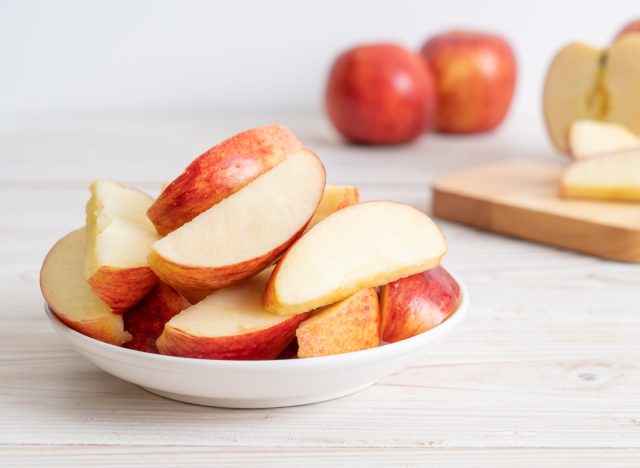
One thing you could do is start every morning with a piece of fruit. Try an apple or a handful of berries, or combine fruit with another fiber-filled breakfast like oatmeal for a double shot of fiber. Eating eggs instead? “Add sliced oranges on the side of your scrambled eggs,” suggests Eat This, Not That! Medical Board Member Lauren Manaker, MS, RDN, a registered dietitian nutritionist and author of The First Time Mom’s Pregnancy Cookbook. “There are tons of creative ways to enjoy fruit in the a.m.”
2Eat oats without the gooey oatmeal.

Oats contain a type of soluble fiber called beta-glucan that lowers blood sugar levels to avoid type 2 diabetes and improve overall metabolic health, according to a study in the Journal of Functional Foods. But let’s say you can’t stand the taste and texture of hot oatmeal in the morning. Do you like muffins? Muffins made with rolled or steel-cut oats deliver fiber in a satisfying gastronomic vehicle that goes great with coffee. Make it even healthier by adding apple and cinnamon as this Apple Cinnamon Oat Muffin recipe does from A Healthy Slice of Life.
3Change up your pasta.
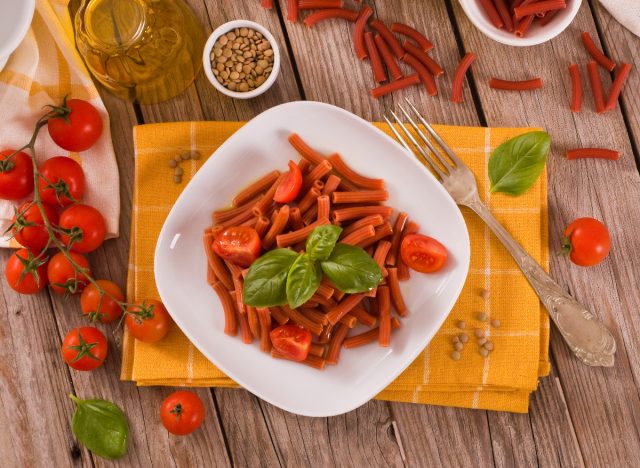
Do you go back for seconds after eating a plate of spaghetti? Or do you feel hungry a half hour after you finish? That’s because typical pasta is made from white flour that’s had all the fiber removed through processing. In fact, eating it can raise your blood sugar almost as quickly as downing a sugary soft drink does.
The solution is to choose pasta made from whole-grain flours, says Eat This, Not That! Medical Review Board member and registered dietitian Amy Goodson, MS, RD. You can find several brands in your local grocery store. Read ingredients lists and look for pastas made with lentils, chickpeas, pea protein, spelt, and barley. One popular brand Goodson recommends is Banza Pasta, made from chickpea flour, which provides 5 grams of satiating fiber per serving.
4Hide fiber in your pasta sauce.
Even regular pasta that contains no fiber can be made healthier by sneaking fiber into the sauce you put on top. Add any cut-up vegetables to your jarred or homemade sauce to introduce a healthy dose of dietary fiber. Or add lentils, white beans, or kidney beans. Just one cup of these will contribute 5 to 20 grams of fiber to the dish.
5Go berry picking.
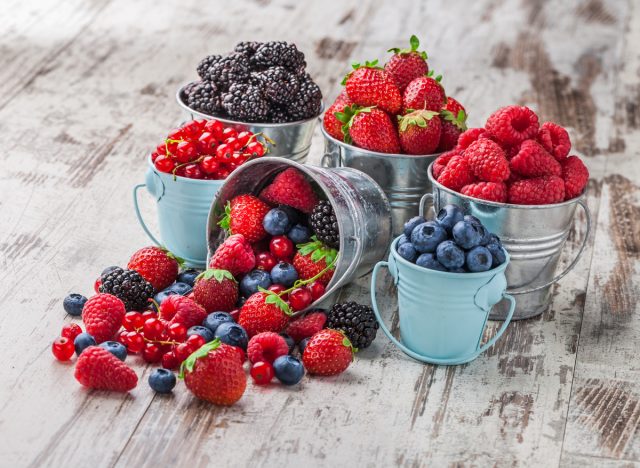
Head out to an orchard or local farm to pick your own fiber. In the fall, pick a bushel of apples, or in the summertime, pick raspberries or blueberries. Fresh-picked wild blueberries beat out the store-bought wild blueberries, because “they have more fiber and a bit less sugar than conventional blueberries,” says Upton.
6Eat some natural candy.
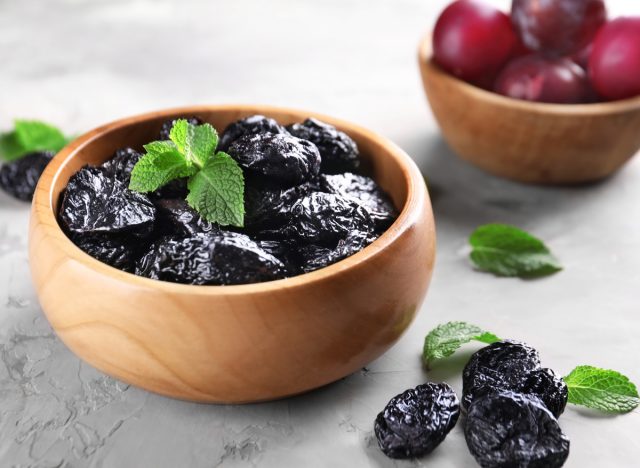
We’re talking about sweet, chewy prunes. There’s a reason why prunes are always on the menu at hospitals. The 3 grams of fiber patients get in a serving of 5 prunes can help them bring their bowels back into regularity.
7Make a fiber-licious smoothie or salad.

“One of my favorite ways to get more fiber is by adding pears into smoothies, munching on them as a grab-and-go-snack, or mixing sliced pears into salads,” says Eat This, Not That! Medical Review Board member Toby Amidor, MS, RD.
Pears are one of the best fruit sources of fiber, with one medium-sized pear providing 21% of the recommended daily intake. “The soluble fiber in pears may reduce the risk for heart disease and some types of cancer,” Amidor says. Try tossing slices or chunks of pears into salads like Amidor’s Lighter Waldorf Salad with Pears or add them to a muffin batter as in this recipe for Pear Pumpkin Seed Muffins.
8Go to the movies.

Catch a good flick at the local multiplex and sneak in a bag of homemade popcorn. “Popcorn is a healthy whole grain,” says Upton. “You get 3.5 grams of fiber in a 3-cup serving of air-popped popcorn.”
9Keep a stash of these around.
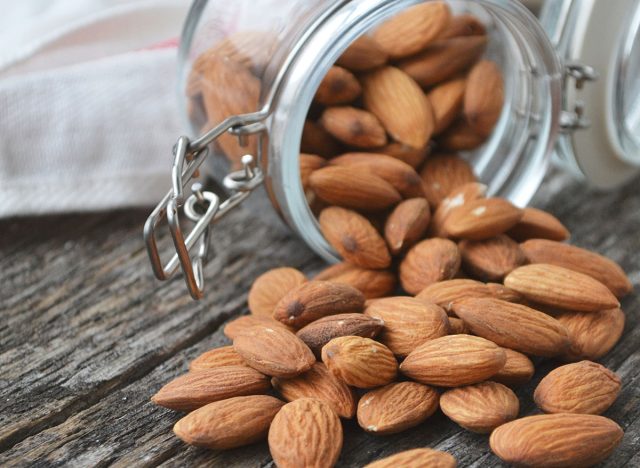
Belly growling at work? Reach into your desk for a bag of dry roasted almonds (14.8 grams fiber per cup) or walnuts (8.5 grams). Also stash a container of chia seeds to toss into smoothies, yogurt, salads, and more. A tablespoon of chia seeds packs 6 grams of fiber.
10Mix this in your orange juice.
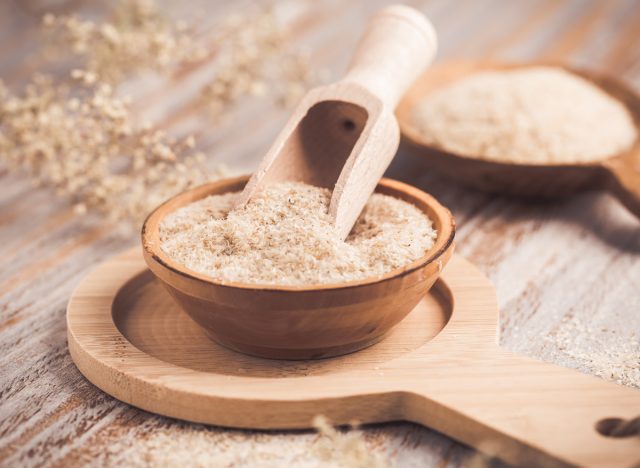
A very simple way to get more soluble fiber into your diet is by drinking it. Mix some psyllium husk powder in a tall glass of water, orange juice, or other beverage and drink up. Psyllium husk, the key ingredient in Metamucil, is a plant fiber supplement that’s been clinically shown to be effective against chronic constipation, ulcerative colitis, hemorrhoids, and irritable bowel syndrome, according to a report in the journal Nutrition Today.
Psyllium, which turns into a gel in your small intestine, slows the absorption of nutrients and sugars, improving blood sugar control and reducing hunger, which can result in weight loss and reduced risk of type 2 diabetes. And the soluble fiber is well-known for lowering LDL (“bad”) and total cholesterol without affecting the good HDL cholesterol. You can find various types of psyllium products in powders, tablets, and even gummies in your pharmacy.
Source: https://www.eatthis.com







